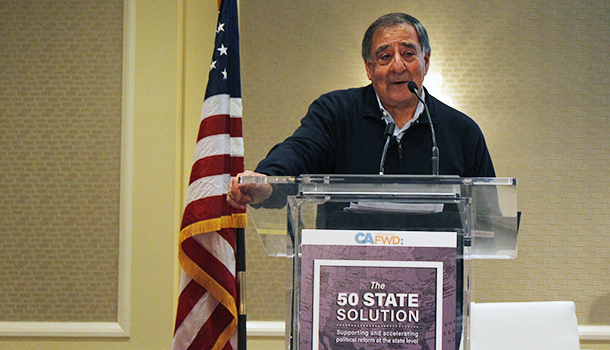
Former Secretary of Defense Leon Panetta speaks at CA Fwd's 50 State Solution event (Photo Credit: John Guenther/CA Fwd)
If the presidential election offered any single lesson to the group of political reformers from around the country who gathered in San Francisco last week to align efforts and begin the difficult task of restoring trust in American governance, it may be this: “Change in a democratic society can happen a lot of different ways,” former secretary of defense Leon Panetta said at the 50 State Solution conference organized by California Forward. “Dynamite represents change, too. But is it effective? I don’t think so.”
Panetta and many other speakers noted the anger and frustration that has come to dominate national politics—most of directed at dysfunction in Washington (and, over the last week, in the backlash against the new administration’s approach to solving it). But populism and the federal government weren’t the focus of the 50 State Solution: Instead, more than one hundred reformers from across the country discussed how they could organize to expand on a new wave of state-level political reforms that can directly improve the democratic process and help restore citizens’ trust in government, from citizens redistricting and open primaries to automatic voter registration and campaign finance reform.
“Even before November, we recognized that no matter who won the election, it was unlikely that Washington D.C. was going to become the epicenter for political reform in America today,” said Chris Gates, executive vice president of external affairs at the Council on Foundations and a senior fellow at California Forward. “One of the few things both parties can agree on is there’s not much appetite for political reform.”
This lack of trust in parties, once they are in power, to adopt changes to the system that put them there was a central theme of the conference. Experts from state and national organizations spent much of the day exploring ways to overcome this challenge in both red and blue states—and sharing ideas for communicating with voters about the problem they are trying to solve. Reformers have long emphasized the need for more transparency and accountability and ethics in American government, but national discontent and the rise of populism have revealed the power of a simpler message: A growing number of Americans on the left and the right clearly believe the political system is rigged—and they want to see something done about it.
While the new administration swept into office in a wave of promises to address this through federal action, the 50 State Solution focused on constructive ways to work together to improve state electoral and governance systems—and restore trust in local democratic process. “There were people here from across the country who every morning wake up and think about how to better engage the public and get them involved the democratic process—and what reforms are needed at the local and state and national level to do that,” said Ashley Swearengin, the former mayor of Fresno who co-chaired the event along with Secretary Panetta. “It was really inspiring, and it was a great way to launch [this effort].”
Many reformers take comfort in the success of major political reforms in large states like California, in particular, where partisan gridlock a decade ago inspired a wave of reforms that established a citizens commission to draw the boundaries of elected officials’ districts, a new primary system that allows more independent voters to participate, an automatic voter registration system, and a series of other changes that have made the legislative process more transparent.
Dozens of other states are moving in the same direction—with thirteen other states recently establishing citizens redistricting commissions, for example, and 28 states adopting automatic voter registration. In 2016, Maine became the first state in the country to adopt the practice of ranked-choice voting in primary and general elections, while Colorado is experimenting with a new ethics oversight system.
That’s not to say the political reform movement has avoided its bumps along the road: Leaders from both parties in the state of Washington recently torpedoed a series of campaign finance reforms pushed by good government groups, and Republicans in South Dakota are actively working to undermine a set of ethics reforms approved by voters in 2016.
“What we’re seeing is that even when you win some things, if the establishment is against you, you’re in for one hell of a fight,” Secretary Panetta noted. “We have to be ready for this. It doesn’t mean you can’t win, but we’re going to have to defend it.”
This was perhaps the most important question addressed by the group—with experts offering ideas for how to organize the disparate network of state-level political reformers around a change agenda. Chris Gates outlined a set of principles for this “50 state solution,” emphasizing the need for the effort to remain bipartisan (with both Republicans and Democrats involved), nonpartisan (avoiding reforms that would advantage one side over the other), trans-partisan (seeking ideas from across the political spectrum), and state-focused. Gates previewed an early-stage web platform the group can use to stay connected, which will be built out with more information about state reform efforts and their effectiveness. At the end of the conference, the New American Foundation offered to take a leadership role in this effort, with CA Fwd and its partners offering additional support.
“We’re not attempting to come out with integrated alignment: a playbook of reform that everyone will follow,” said Lenny Mendonca, co-chair of California Forward, in his remarks at the event. “But we hope everyone here can come out of here with some new plays and use them in their own ways to make a difference. And we want all reformers or would-be reformers out there to feel like they have a commitment from all of us that we can work in the states—the laboratories of democracy—to make things better.”

